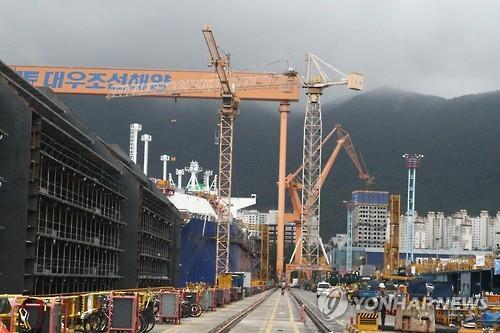Banks worry over reserve requirements as shipbuilding industry tumbles
By 최희석Published : May 25, 2016 - 09:49
The imminent overhaul of the shipbuilding industry is shaking up local banks, which will have to raise their reserves once the loans to companies are reclassified as risky, financial officials said Wednesday.
The majority of the loans to the troubled shipbuilders -- Daewoo Shipbuilding & Marine Engineering, Hyundai Heavy Industries and Samsung Heavy Industries -- are categorized as "normal" in risk ratings, a far cry from the firms' abysmal financial standings.

Local banks' exposure to the three shipbuilders amounts to 50 trillion won ($41.93 billion), with Daewoo Shipbuilding accounting for close to half at 23 trillion won. Both policy and commercial banks are tied to the loans to the company that for the past three years had to take out more loans to pay interest. Kookmin Bank is the sole commercial bank to have raised the risk level for the firm but did not do so until March.
Exposure to Hyundai Heavy currently stands at 17.4 trillion won, with Samsung Heavy at 14 trillion won. Loans to these two companies are also mostly rated as normal in risk.
Financial officials cite that banks often resist raising the credit risk ratings because of the reserve requirements that they entail. A change of just one level to substandard credit would require banks to have up to 4.3 trillion won more in reserves. The Export-Import Bank of Korea, which has 12.6 trillion won in loans to Daewoo Shipbuilding, and the Korea Development Bank (KDB), with 6.3 trillion won in exposure, will each need 3 trillion won more in reserves from the change.
Officials at creditor banks say that the burden of a reserve increase most likely affects policy banks like KDB in considering a change in risk classification.
"They said Daewoo Shipbuilding is a zombie company, but the firm has been paying interest, and we couldn't be the only one to change the risk assessment when key creditor banks were maintaining their classification," an official at one of the creditor banks said.
But outside watchers put more onus on banks for the fallout, holding them responsible for not acting quickly even when the alarms were loud and clear.
Oh Jung-gun, a professor of financial IT at Konkuk University in Seoul, said banks need to be held accountable for failing to make prompt and appropriate assessments.
"Analyzing the shipbuilding industry requires looking at the market at least a year ahead and understanding the global economic trends," Oh said. "Banks may not have done the extensive research."
"It may be because of the pressure for performance. It may be because they were conscious of what financial authorities were thinking. The important point is that they have to be held responsible for not doing the evaluations when the companies are in this mess," Oh said.
Sohn Sang-ho, a senior researcher at the Korea Institute of Finance, said the banks were being submissive to the authorities, hesitant to take action on a big company like Daewoo Shipbuilding.
"The banks would have acted long ago if the companies involved were small," he said. "Realistically, it's difficult for banks to make their own decisions on loans for companies like Daewoo Shipbuilding." (Yonhap)








![[KH Explains] How should Korea adjust its trade defenses against Chinese EVs?](http://res.heraldm.com/phpwas/restmb_idxmake.php?idx=644&simg=/content/image/2024/04/15/20240415050562_0.jpg&u=20240415144419)










![[Today’s K-pop] Stray Kids to return soon: report](http://res.heraldm.com/phpwas/restmb_idxmake.php?idx=642&simg=/content/image/2024/04/16/20240416050713_0.jpg&u=)